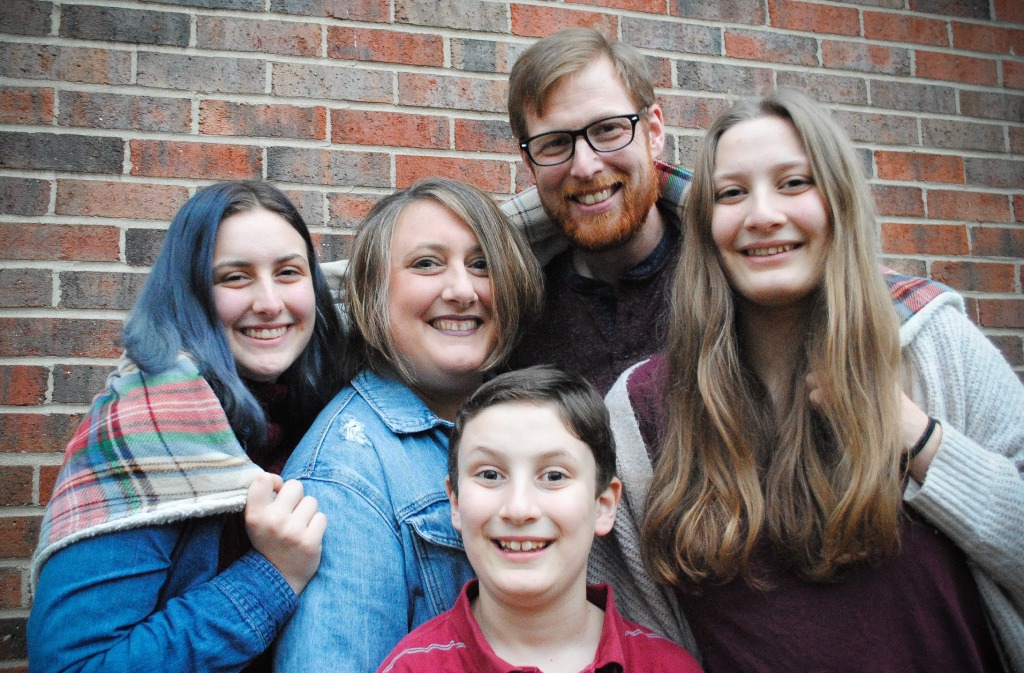The God I gave my kids was too small. Way too small.
He was wrapped up in stories that didn’t allow their minds to imagine His greatness, crafts that were easily discarded, and memorized verses that lacked the context of His vastness.
It wasn’t that I wanted to do that or even tried to do that. But the resources at my fingertips, the church programs I could plug my kids into, and the avenues I thought needed to be taken to teach my kids about God were just too small.
It was like trying to teach them about the world with a map of our state.
In 2013, our family moved from our home in Pennsylvania to seminary in Kentucky. We moved into seminary housing with other families who were attending seminary. These families were from all over the United States and more importantly, all over the world.
And suddenly, within mere months, the God of my children grew bigger and stronger and wider than they could have ever imagined. This God they had been taught about with a certain accent, a certain slant, and a certain view was suddenly met by a global expression of faith and experience that exceeded their understanding.
They were introduced to viewpoints and ideas that they had never heard. They watched their Kenyan friends worship alongside their Singaporean friends in vastly different ways that were nonetheless sincere and real. They interacted with elders and children, adults and teens, who all followed their God but in different ways. They heard theology debated, viewpoints expressed, and denominational differences discussed in a way that didn’t diminish their faith but opened it up wider. Hearing the same verses shared in different ways, listening to the Bible stories take on new meaning in different cultural contexts, and watching interactions with individuals that believed in Jesus differently than them but with fervor and grace that can only be described as holy offered my kids a much bigger God.
I often look at children in church and wonder, “Are we giving them a big enough God?” If their world of imagination is so big, are the stories we tell them, big enough to fill the space?
A lot of the Bible stories I hear in church are just that…stories. They have a limited scope, beginning and end. They have limited heroes and villians like David and Goliath and Daniel and the lions and Jonah and the Whale. They have limited life lessons like “Be brave because God is with you” and “Be obedient when God tells you what to do.”
“We tend to give kids superficial lessons in the Christian faith but we’ve found that superficial teaching leads to superficial Christians. The formula for teaching Scripture to kids has become a biblical value + a verse to back it up + a song to make it memorable”.
Phil Vischer
The power of intergenerational ministry, the strength of connecting to others outside of our own tradition or experiences, is that we see God more clearly. We may arrive at some different conclusions about how our theology is lived out, but our spiritual family gets bigger and our capacity to imagine with wonder and awe about God grows exponentially.
So, how can we let them wonder?
- Let them ask questions and don’t have all the answers – I know that is so hard to do, but sometimes the best way for kids to learn about God is to wonder aloud to Him (we call it prayer) and let Him answer them in His way and time.
- Ask “Wonder Questions” – There’s a great curriculum called Godly Play written by Jerome Barryman that incorporates asking “wonder questions” into the lesson. In other words, while the lesson is being shared, the teacher will say things like, “I wonder why the shepherd went to find the lost sheep? I wonder why the other sheep stayed in the pen? I wonder who is our Shepherd?” I like to do this with my own kids, even my older ones, with normal everyday life situations. Things like, “I wonder why He made the grass green? I wonder why God made some things edible and some things not? I wonder if the birds are singing to Someone? I wonder if God is speaking to his/her heart?”
- Connect them to other believers – Expand their spiritual family table in width and depth; invite older and younger people into your home, believers from other theological streams and traditions; believers from around the world if possible. Give them a breadth of faith family to love and grow with.
- Listen to them tell the stories – Oh, I love, love, love this one! If you know your child, especially your young child, has heard a Bible story, ask them to retell it to you. There are so many times I’ve done this and instead of telling me word-for-word the “right” version of the story, they tell it with a little twist, a subtle plot change or a humorous undertone. What’s so cool about this is you get to hear who their God is according to how they heard and understood the story. And you get to underscore God’s love and goodness if they’ve missed it or even if they hit the nail on the head.
There is a story I’ve often heard repeated where three blindfolded people are led over to an elephant and asked to guess what they were touching. One touches only the side and guesses the he is touching a leather object. The other touches only the trunk and wonders if it is a snake. Another touches the tail and knows it is an animal but is unsure exactly what animal it belongs to. But when they speak to one another and share their experience, they are able to put together an accurate picture and determine they are touching an elephant.
This is what happened to our family in seminary. We got to hear other’s experiences with God, with Scripture, with the church, and with their faith. And, putting it all together, we were given the gift of a clearer image of God and our imaginations of who God is and how He interacts with humanity grew.
As a result, my kids don’t necessarily embrace their faith in the same way that I do. They’ve come to different conclusions about what the Bible says, what Jesus would do, and how God would interact with the world. They’ve talked to a lot more believers about their faith than I ever did.
But as a result, their God is bigger.
Bigger than the stories. Bigger than their own experiences.
A great big God.
Is Your Church READY to Come Together?
Are you interested in moving your church from a traditional, age-segregated into a more family-focused, intergenerational focus, connecting the home and the church?
Refocus Ministry would be happy to begin a conversation with your team and church about the how your church can grow in serving the families of your church and community and connecting your faith community in relationship with each other.
Ongoing coaching through various means is also available as your church continues the transition including weekly emails, monthly on-line trainings, and continued conversations. In addition to one-on-one coaching calls and follow-up resources, the following large-group presentations can be made available to your team, pastoral staff, or congregation.
Options to choose from for these presentations include:
- Presenting on a Sunday morning to your worship service(s)
- A parent webinar on Everyday Discipleship and partnering with the church community
- A presentation on Connecting Generations (importance, need, Biblical foundation) for your leadership team
- A training on a specific area of ministry such as Family VBS, Partnering with Parents, Equipping Volunteers, Creating an Intergenerational Culture for your ministry or leadership team.
- OTHER – We will work to create a presentation that best suits your community’s needs
Use the contact form below to receive a customized quote for your congregations needs. We look forward to journeying with you to make Psalm 145, one generation to another, part of our church’s DNA.
For more information about…
- Kids in Worship
- Determining which Type of Family Ministry model works best for your church
- Discipleship in Intergenerational community
- Encouraging the continued conversation through Practical Discipleship at Home
- Seminars, Workshops, Coaching
Check out to ReFocus Ministry or “like” our Facebook page. Join our conversation at theReFocus Family and Intergen Ministry group on Facebook.
About ReFocus
Refocus Ministry was started by Christina Embree who serves as the Minister of Generational Discipleship with the Great Lakes Conference of the Brethren in Christ. She is also wife to Pastor Luke, mom to three wonderful kids, and pastor at Plowshares BIC.
With years of experience in family ministry and children’s ministry, she is passionate about seeing churches partnering with families to encourage faith formation at home and equipping parents to disciple their kids in the faith. She holds a Masters of Arts in Ministry focusing on Family, Youth and Children’s Ministry and is completing a Doctorate of Ministry in Spiritual Formation at Wesley Seminary, she also blogs at www.refocusministry.org and is a contributing blogger at D6 Family, ChurchLeaders.com, and Seedbed.
The advertisements on this page are chose by the web host and do not necessarily reflect the views of ReFocus Ministry.



